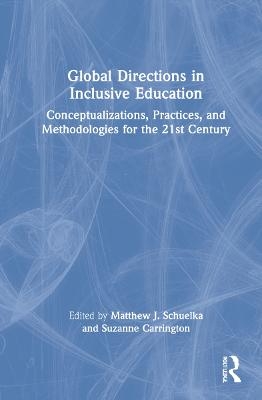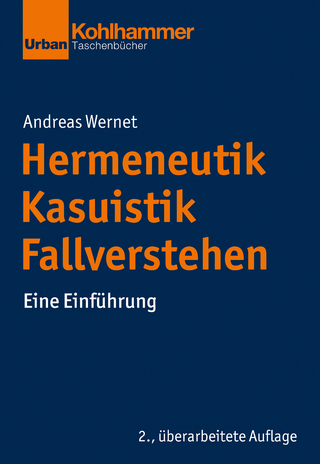
Global Directions in Inclusive Education
Routledge (Verlag)
978-0-367-55095-0 (ISBN)
Global Directions in Inclusive Education pushes the conceptual boundaries of ‘inclusive education’ and explores new ways to research and envision inclusion and diversity in education for all children. This pioneering book problematizes ‘inclusive education’ as a global currency, as another form of deficit-thinking, and as a universal application.
The expert team of international contributors argue that much of the field of inclusive education needs a reinvigoration of new ideas, critical introspection, and ways of knowing that can overcome the well-worn deficit paths of inclusive education study, namely: ‘barriers’ to inclusion, teacher attitudes, policy-practice gaps, lack of resources, and lack of teacher training. Seeking diverse ways forward that represent new visions and innovations from around the world, this text features voices and ideas from both early career and established scholars, to enliven debate and promote a more positive and productive dialogue.
Global Directions in Inclusive Education is ideal for students, researchers, and scholars of inclusive education; development practitioners seeking new ideas; and practitioners seeking to gain a deeper and more global understanding of inclusive education both in theory and in practice.
Matthew J. Schuelka is a researcher at the Institute on Community Integration and lecturer in the College of Education and Human Development at the University of Minnesota, USA. He is also the founder and CEO of Fora Education. Suzanne Carrington is a Professor in The Centre for Inclusive Education (C4IE) and a member of the Faculty of Creative Industries, Education and Social Justice, Queensland University of Technology, Australia.
Table of Contents
Innovative and global directions for inclusive education in the 21st century - Matthew J. Schuelka and Suzanne Carrington
Part I: Conceptual Innovation
International perspectives on inclusive education in rural contexts: Finding (un)common ground - Julie Dillon-Wallace
Beginning with language: Inclusive education strategies with sign languages in Rwanda, Singapore, United States, and Việt Nam - Audrey Cooper, Sonia Holzman, Maegan Shanks, and Phoebe Tay
Affects and materiality in Santiago de Chile’s schools: The importance of relationality in the co-enactment of inclusion - Rosario Palacios
Conceptualising inclusion within Indonesian contexts - Nur Azizah, Elga Andriana, and David Evans
Is inclusive education enough for Australian Aboriginal students? Making the case for belonging education to disrupt the normalised agenda of assimilation - Sheelagh Daniels-Mayes, Gary Fry, and Karen Sinclair
Part II: Pragmatic Innovation
Visibly rewarding learners for academic achievement: The guise of excellence - Shakira Akabor
Diagnosis, integration, and inclusion: The experiences of schools and families in Cambodian policy and practice - Anne E. Crylen
Talking about self: Exploring the potential of teacher’s talk in professional learning communities for inclusive pedagogy - Wacango Kimani
Localizing a universal claim: Applying universal design strategies to support inclusion in Armenia - Armenuhi Avagyan, Christopher Johnstone, Ofelia Asatryan, Lilia Khachatryan, and Aleksandr Shagafyan
Critical reflexivity as a pedagogy for inclusivity in teacher education - Levan Lim and Thana Thaver
Re-turning insights on belonging: An international collaboration between Flanders and New Zealand - Hanne Vandenbussche, Elisabeth De Schauwer, Evelyn Christina, Missy Morton, and Geert Van Hove
Part III: Methodological Innovation
Being seen and heard: Using Photovoice methodology in inclusive education research - Alisha M.B. Braun
Collaborative B-learning as a tool to studying and preparing for inclusion in a culturally diverse environment - Silvia Romero-Conteras, Ismael Garcia-Cedillo, and Gabriela Silva-Maceda
Into the mesa: A case study of Jordanian inclusion policy - Sarah K. Benson
Becoming an activist: A story of parental advocacy for inclusive education - Glenys Mann and the Queensland Collective for Inclusive Education
Exploring the congruence between Bhutanese teachers’ views about inclusion, Gross National Happiness, and Buddhism - Dawa Dukpa, Suzanne Carrington, Sofia Mavropoulou, and Matthew J. Schuelka
| Erscheinungsdatum | 20.12.2021 |
|---|---|
| Zusatzinfo | 15 Tables, black and white; 3 Line drawings, black and white; 25 Halftones, black and white; 28 Illustrations, black and white |
| Verlagsort | London |
| Sprache | englisch |
| Maße | 156 x 234 mm |
| Gewicht | 598 g |
| Themenwelt | Sozialwissenschaften ► Pädagogik ► Allgemeines / Lexika |
| Sozialwissenschaften ► Pädagogik ► Bildungstheorie | |
| Sozialwissenschaften ► Pädagogik ► Sonder-, Heil- und Förderpädagogik | |
| ISBN-10 | 0-367-55095-4 / 0367550954 |
| ISBN-13 | 978-0-367-55095-0 / 9780367550950 |
| Zustand | Neuware |
| Informationen gemäß Produktsicherheitsverordnung (GPSR) | |
| Haben Sie eine Frage zum Produkt? |
aus dem Bereich


